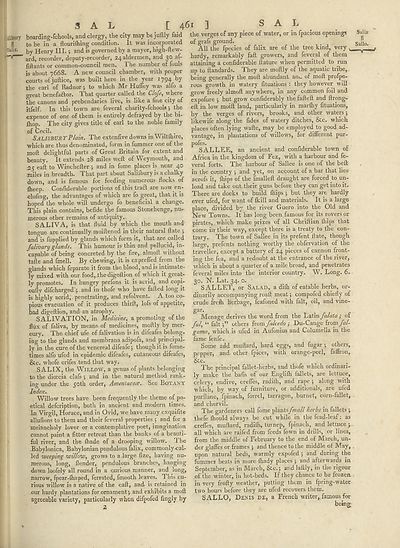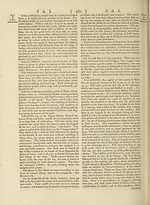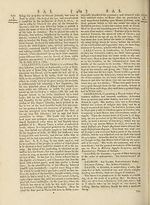Encyclopaedia Britannica, or, a Dictionary of arts, sciences, and miscellaneous literature : enlarged and improved. Illustrated with nearly six hundred engravings > Volume 18, RHI-SCR
(481) Page 461
Download files
Complete book:
Individual page:
Thumbnail gallery: Grid view | List view

SAL
[ 461 ]
SAL
boarding-fchools, and clergy, the city may bejuftly faid
to be in a flourifhing condition. It was incorporated
by Henry III. 5 and is governed by a mayor, high-ftew-
ard, recorder, deputy-recorder, 24 aldermen, and 30 af-
fiftants or common-council men. The number of fouls
is about 7668. A new council chamber, with proper
courts of juftice, was built here in the year 1794 by
the earl of Radnor •, to which Mr Huffey was alfo a
great benefa&or. That quarter called the Clofe, where
the canons and prebendaries live, is like a fine city of
itfelf. In this town are feveral charity-fchools *, the
expence of one of them is entirely defrayed by the bi-
ftiop. The city gives title of earl to the noble family
of Cecil.
SALISBURY Plain. The extenfive downs inWiltlhire,
which are thus denominated, form in fummer one of the
moft delightful parts of Great Britain for extent and
beauty. It extends 28 miles weft of Weymouth, and
25 eaft to WRnchefter *, and in fome places is near 40
miles in breadth. That part about Saliftmry is a chalky
down, and is famous for feeding numerous flocks of
fheep. Confiderable portions of this tra61 are now en-
clofing, the advantages of which are fo great, that it is
hoped the whole will undergo fo beneficial a change.
This plain contains, befide the famous Stonehenge, nur
merous other remains of antiquity.
SALIVA, is that fluid by which the mouth and
tongue are continually raoiftened in their natural ftate }
and is fupplied by glands which form it, that are called
falivaryglands. This humour is thin and pellucid, in¬
capable of being concreted by the fire, almoft without
tafte and fmell. By chewing, it is expreffed from the
glands which feparate it from the blood, and is intimate¬
ly mixed with our food,,thedigeftion of which it great¬
ly promotes. In hungry perfons it is acrid, and copi-
oufly difcharged 4 and in thofe who have fafted long it
is highly acrid, penetrating, and refolvent. A too co¬
pious evacuation of it produces thirft, lofs of appetite,
bad digeftion, and an atrophy.
SALIVATION, in Medicine, a promoting of the
flux of faliva, by means of medicines, moftly by mer¬
cury. The chief ufe of falivation is in difeafes belong-
ing to the glands and membrana adipofa, and principal¬
ly in the cure of the venereal difeafe j though it is fome-
times alfo ufed in epidemic difeafes, cutaneous difeafes,
&c. whofe crifes tend that way.
SALIX, the Willow, a genus of plants belonging
to the dioecia clafs ; and in the natural method rank¬
ing under the 50th order, Amentacsce. See Botany
Index.
Willow trees have been frequently the theme of po¬
etical defeription, both in ancient and modern times.
In Virgil, Horace, and in Ovid, we have many exquifite
allufions to them and their feveral properties ; and for a
melancholy lover or a contemplative poet, imagination
cannot paint a fitter retreat than the banks of a beauti¬
ful river, and the (hade of a drooping willow. I he
Babylonica, Babylonian pendulous falix, commonly-cal¬
led weeping willow, grows to a large fize, having nu¬
merous, long, flender, pendulous branches, hanging
down loofely all round in a curious manner, and long,
narrow, fpear-ftiaped, ferrated, fmooth leaves. I his cu¬
rious willow is a native of the eaft, and is retained in
our hardy plantations for ornament j and exhibits a moft
agreeable variety, particularly when difpofed ftngly by
the verges of any piece of water, or in fpacious openings
of grafs ground.
All the fpecies of falix are of the tree kind, very
hardy, remarkably faft growers, and feveral of them
attaining a confiderable ftature when permitted to run
up to ftandards. They are moftly of the aquatic tribe,
being generally the moft abundant ane of moft profpe-
rous growth in watery fituations : they however will
grow freely almoft anywhere, in any common foil and
expofure j but grow confiderably the fafteft and ftrong-
eft in low moift land, particularly in marfhy fituations,
by the verges of rivers, brooks, and other waters ;
likewife along the fides of watery ditches, &c. which
places often lying wafte, may be employed to good ad¬
vantage, in plantations of willows, for different pur-
pofes.
SALLEE, an ancient and confiderable town of
Africa in the kingdom of Fez, with akarbour and fe¬
veral forts. The harbour of Sallee is one of the beft
in the country j and yet, on account of a bar that lies
acrofs it, fhips of the fmalleft draught are forced to un¬
load and take out their guns before they can get into it.
There are docks to build (hips ; but they are hardly
ever ufed, for want of Ikill and materials. It is a large
place, divided by the river Guero into the Old and
New Towns.. It has long been famous for its rovers or
pirates, which make prizes of all Chriftian Ihips that
come in their way, except there is a treaty to the con¬
trary. The town of Sallee in its prefent ftate, though
large, prefents nothing worthy the obfervation of the
traveller, except a battery of 24 pieces of cannon front¬
ing the fea, and a redoubt at the entrance of the river,
which is about a quarter of a mile broad, and penetrates
feveral miles into the interior country. W. Long. 6.
30. N. Lat. 34. O.
SALLET, or Salad, a difli of eatable herbs, or¬
dinarily accompanying roaft meat *, compofed chiefly of
crude freftr herbage, feafoned with fait, oil, and vine-
gar.
Menage derives the word from the Latin falata $ of
ful, “ fait others from falcedo ; Du-Cange from/a/-
gama, which is ufed in Auionius and Columella in the
fame fenfe.
Some add muftard, hard eggs, and fugar *, others,
pepper, and other fpices, with orange-peel, faffron,
&.C.
The principal fallet-herbs, and thofe which ordinari¬
ly make the bafis of our Englifli fallets, are lettuce,
celery, endive, creffes, radilh, and rape j along with
which, by way of furniture, or additional, are ufed
purflane, fpinach, forrel, tarragon, burnet, corn-fallet,
and chervil.
The gardeners call fome plantsfmall herbs in fallets;
thefe Ihould always be cut while in the fead-leaf: as
crcffes, muftard, radilh, turnep, fpinach, and lettuce >
all which are raifed from feeds fown in drills, or lines,
from the middle of February to the end of March, un¬
der glaffes or frames j and thence to the middle ot May,
upon natural beds, warmly expofed ; and during the
fumraer heats in more ftiady places $ and afterwards in
September, as in March, &c.j and laftly, in the rigour
of the winter, in hot-beds. If they chance to be frozen,
in very frofty weather, putting them in fpring-water
two hours before they are ufed recovers them.
SALLO, Denis DE, a French writer, famous for
being
Salix
Sallo.
[ 461 ]
SAL
boarding-fchools, and clergy, the city may bejuftly faid
to be in a flourifhing condition. It was incorporated
by Henry III. 5 and is governed by a mayor, high-ftew-
ard, recorder, deputy-recorder, 24 aldermen, and 30 af-
fiftants or common-council men. The number of fouls
is about 7668. A new council chamber, with proper
courts of juftice, was built here in the year 1794 by
the earl of Radnor •, to which Mr Huffey was alfo a
great benefa&or. That quarter called the Clofe, where
the canons and prebendaries live, is like a fine city of
itfelf. In this town are feveral charity-fchools *, the
expence of one of them is entirely defrayed by the bi-
ftiop. The city gives title of earl to the noble family
of Cecil.
SALISBURY Plain. The extenfive downs inWiltlhire,
which are thus denominated, form in fummer one of the
moft delightful parts of Great Britain for extent and
beauty. It extends 28 miles weft of Weymouth, and
25 eaft to WRnchefter *, and in fome places is near 40
miles in breadth. That part about Saliftmry is a chalky
down, and is famous for feeding numerous flocks of
fheep. Confiderable portions of this tra61 are now en-
clofing, the advantages of which are fo great, that it is
hoped the whole will undergo fo beneficial a change.
This plain contains, befide the famous Stonehenge, nur
merous other remains of antiquity.
SALIVA, is that fluid by which the mouth and
tongue are continually raoiftened in their natural ftate }
and is fupplied by glands which form it, that are called
falivaryglands. This humour is thin and pellucid, in¬
capable of being concreted by the fire, almoft without
tafte and fmell. By chewing, it is expreffed from the
glands which feparate it from the blood, and is intimate¬
ly mixed with our food,,thedigeftion of which it great¬
ly promotes. In hungry perfons it is acrid, and copi-
oufly difcharged 4 and in thofe who have fafted long it
is highly acrid, penetrating, and refolvent. A too co¬
pious evacuation of it produces thirft, lofs of appetite,
bad digeftion, and an atrophy.
SALIVATION, in Medicine, a promoting of the
flux of faliva, by means of medicines, moftly by mer¬
cury. The chief ufe of falivation is in difeafes belong-
ing to the glands and membrana adipofa, and principal¬
ly in the cure of the venereal difeafe j though it is fome-
times alfo ufed in epidemic difeafes, cutaneous difeafes,
&c. whofe crifes tend that way.
SALIX, the Willow, a genus of plants belonging
to the dioecia clafs ; and in the natural method rank¬
ing under the 50th order, Amentacsce. See Botany
Index.
Willow trees have been frequently the theme of po¬
etical defeription, both in ancient and modern times.
In Virgil, Horace, and in Ovid, we have many exquifite
allufions to them and their feveral properties ; and for a
melancholy lover or a contemplative poet, imagination
cannot paint a fitter retreat than the banks of a beauti¬
ful river, and the (hade of a drooping willow. I he
Babylonica, Babylonian pendulous falix, commonly-cal¬
led weeping willow, grows to a large fize, having nu¬
merous, long, flender, pendulous branches, hanging
down loofely all round in a curious manner, and long,
narrow, fpear-ftiaped, ferrated, fmooth leaves. I his cu¬
rious willow is a native of the eaft, and is retained in
our hardy plantations for ornament j and exhibits a moft
agreeable variety, particularly when difpofed ftngly by
the verges of any piece of water, or in fpacious openings
of grafs ground.
All the fpecies of falix are of the tree kind, very
hardy, remarkably faft growers, and feveral of them
attaining a confiderable ftature when permitted to run
up to ftandards. They are moftly of the aquatic tribe,
being generally the moft abundant ane of moft profpe-
rous growth in watery fituations : they however will
grow freely almoft anywhere, in any common foil and
expofure j but grow confiderably the fafteft and ftrong-
eft in low moift land, particularly in marfhy fituations,
by the verges of rivers, brooks, and other waters ;
likewife along the fides of watery ditches, &c. which
places often lying wafte, may be employed to good ad¬
vantage, in plantations of willows, for different pur-
pofes.
SALLEE, an ancient and confiderable town of
Africa in the kingdom of Fez, with akarbour and fe¬
veral forts. The harbour of Sallee is one of the beft
in the country j and yet, on account of a bar that lies
acrofs it, fhips of the fmalleft draught are forced to un¬
load and take out their guns before they can get into it.
There are docks to build (hips ; but they are hardly
ever ufed, for want of Ikill and materials. It is a large
place, divided by the river Guero into the Old and
New Towns.. It has long been famous for its rovers or
pirates, which make prizes of all Chriftian Ihips that
come in their way, except there is a treaty to the con¬
trary. The town of Sallee in its prefent ftate, though
large, prefents nothing worthy the obfervation of the
traveller, except a battery of 24 pieces of cannon front¬
ing the fea, and a redoubt at the entrance of the river,
which is about a quarter of a mile broad, and penetrates
feveral miles into the interior country. W. Long. 6.
30. N. Lat. 34. O.
SALLET, or Salad, a difli of eatable herbs, or¬
dinarily accompanying roaft meat *, compofed chiefly of
crude freftr herbage, feafoned with fait, oil, and vine-
gar.
Menage derives the word from the Latin falata $ of
ful, “ fait others from falcedo ; Du-Cange from/a/-
gama, which is ufed in Auionius and Columella in the
fame fenfe.
Some add muftard, hard eggs, and fugar *, others,
pepper, and other fpices, with orange-peel, faffron,
&.C.
The principal fallet-herbs, and thofe which ordinari¬
ly make the bafis of our Englifli fallets, are lettuce,
celery, endive, creffes, radilh, and rape j along with
which, by way of furniture, or additional, are ufed
purflane, fpinach, forrel, tarragon, burnet, corn-fallet,
and chervil.
The gardeners call fome plantsfmall herbs in fallets;
thefe Ihould always be cut while in the fead-leaf: as
crcffes, muftard, radilh, turnep, fpinach, and lettuce >
all which are raifed from feeds fown in drills, or lines,
from the middle of February to the end of March, un¬
der glaffes or frames j and thence to the middle ot May,
upon natural beds, warmly expofed ; and during the
fumraer heats in more ftiady places $ and afterwards in
September, as in March, &c.j and laftly, in the rigour
of the winter, in hot-beds. If they chance to be frozen,
in very frofty weather, putting them in fpring-water
two hours before they are ufed recovers them.
SALLO, Denis DE, a French writer, famous for
being
Salix
Sallo.
Set display mode to:
![]() Universal Viewer |
Universal Viewer | ![]() Mirador |
Large image | Transcription
Mirador |
Large image | Transcription
Images and transcriptions on this page, including medium image downloads, may be used under the Creative Commons Attribution 4.0 International Licence unless otherwise stated. ![]()
| Permanent URL | https://digital.nls.uk/193024960 |
|---|
| Attribution and copyright: |
|
|---|
| Description | Ten editions of 'Encyclopaedia Britannica', issued from 1768-1903, in 231 volumes. Originally issued in 100 weekly parts (3 volumes) between 1768 and 1771 by publishers: Colin Macfarquhar and Andrew Bell (Edinburgh); editor: William Smellie: engraver: Andrew Bell. Expanded editions in the 19th century featured more volumes and contributions from leading experts in their fields. Managed and published in Edinburgh up to the 9th edition (25 volumes, from 1875-1889); the 10th edition (1902-1903) re-issued the 9th edition, with 11 supplementary volumes. |
|---|---|
| Additional NLS resources: |
|

